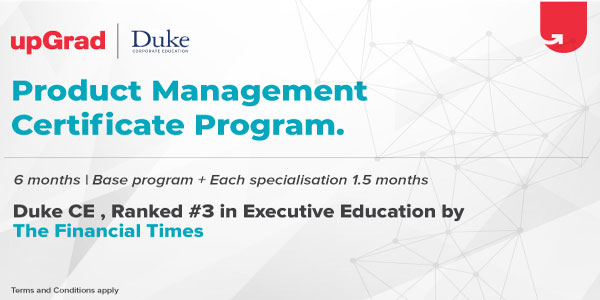Try Googling “product manager vs. product owner”, and you’ll be greeted with the following related questions:

This shows the air of confusion that exists in both businesses and professionals with regard to these two terms. While product owners and managers are both extremely important for Agile project management teams, the duties they perform tend to differ.
If you’re looking to switch to the world of Product Development and are finding suitable roles for yourself, it’s important to know about the differences between these two profiles. Let’s dive right into the intricacies of these terms and try to answer the much-debated question – who runs the show?
Owner, Manager: Ambiguity Begets Confusion!
One of the primary reasons for the confusion between these two terms is the sheer ambiguity of the terms ‘owner’ and ‘manager’. At first glance, it would look as if the owner is higher than the manager, on a typical organizational hierarchy. However, the Agile framework breaks down these predefined hierarchies.
In an Agile framework, both managers and owners work in tandem and act as two crucial arms for the entire product development process. Here’s a brief distinction between PMs and POs:
- Managers are more strategic in nature, in the sense that they drive various visions and goals for the product.
- Owners are more tactical and are looking for ways to refine, modify, or improve the product features and functions.
With these basic differences in place, let’s talk about some more similarities and differences in the two roles.
Similarities and Differences in Product Owners and Product Managers
Product Owners have got more to do with handling product teams and ensuring that all the goals are met. Managers, on the other hand, are more concerned with customers and their response to the product. In this light, here is a key difference between product managers and product owners:
- Product managers are more customer-facing. They perform market research, competitor analysis, surveys and questionnaires, and other tasks in order to understand customer sentiments and requirements. Then, they develop the vision and strategies for the product.
- Product owners, on the other hand, are more team-facing. They work closely with different components of the product team and are responsible for ensuring top-notch work from the product teams. They also take care of things like time-to-market and other important deadlines that shouldn’t be missed.
The above reasons might look confusing if you’re a beginner. After all, these two roles seem very overlapping if you look at them from the outside. You’re not wrong in thinking that, and to clarify things a bit more for you, let’s look at some essential overlaps between the roles of product owners and product managers.
- Product managers, while being customer-facing, need to stay in touch with the product teams. They need to be a part of Scrum meetings and work on wireframes and prototypes. That is because PMs are responsible for deciding the overall vision, so it’s essential to work closely with the product teams.
- Product owners, on the other hand, must understand and empathize with customer requirements. If they lack this, any product that they work on will keep missing out on various pain points of the customers. Product owners should also liaise with the product manager to collect customer feedback, participate in product demos, write the user story, and more.
Here are some more differences between product owners and product managers, elaborate for a better understanding:
|
Product owners
|
Product managers
|
| The voice of customers for creating product vision. | The custodian of product vision on the behalf of stakeholders and business sponsors. |
| Responsible for delivering value to the end-users. | Accountable for roadmaps and strategic business outcomes. |
| Ensure that the voice of the customers is heard across different product decisions throughout the organization. | Refine and adjust product strategy and vision based on customer sentiments. |
| Maintain a short-term to mid-term focus on product sprints and releases. | Have a long-term focus on customer support and ongoing product capabilities. |
| Responsible for defining user stories, epics, and deciding the success criteria. | Accountable for defining high-level epics and the MVP. |
Product Owner vs. Product Manager – Which Path to Take?
Apart from the business needs, there are various factors that go into determining the correct path for you. Depending on how you want your career trajectory to be, you can pick either of the two job roles. 20 years ago, the difference between these two job roles was more significant. However, because of Agile workflow, the differences have decreased drastically.
Here’s one strategic distinction for you to keep in mind before deciding the path you should take.
- Product owners help in building the product. So, if you have an inclination towards engineering products and working with the Agile project management paradigm, you might want to take a deeper look at the product owner job role.
- Product managers perform market research and competitor analysis. So, if your aptitude is more towards researching and finding out the missing features and working collaboratively with different teams like marketing, sales, product dev, and more, then product management might be the right fit for you.
With that settled, let’s now move to the more obvious questions – what precise skills are required to succeed at both these job roles?
Product Owner vs. Product Manager – A Comparison of Skills
Here is a list of some essential skills required for product owner job roles:
- Team management skills. A successful product owner needs to be able to build trust across different teams. That requires good team management skills.
- Communication capabilities. Product owners need to constantly communicate their findings to stakeholders and development teams. Therefore, the ability to communicate seamlessly is a must to excel as a product owner.
- Design thinking. Product owners must be comfortable with forming hypothesis-driven development environments in order to drive product innovations.
- Customer empathy. Product owners need to be aware of their customers’ needs and should know the ways to bridge that gap using product modifications or additional features.
Now, let’s look at some key skills required to become a successful product manager:
- Research skills. Product managers need to be hands-on with research skills. You should be able to look into the market numbers and figure out the next best steps for your product.
- Leadership skills. Since product managers are responsible for taking care of long-term product vision, they must have strong leadership skills to keep things under control.
- Presentation skills. The second most important thing after performing market research is presenting the information to stakeholders of the product. This requires the product manager to have impeccable presentation skills.
- Technical knowledge. Product managers work more closely with development teams and guide engineers. As a result, they need to be hands-on with the technologies on which the product runs, and should be available to help the developers whenever required.
In Conclusion
As you can see, the difference between a product owner and a product manager is not that huge, but it’s important to know all the subtleties in order to make the right career decision.
If you’re looking for a career change and are seeking professional help – upGrad is just for you. We have a solid 85+ countries learner base, 40,000+ paid learners globally, and 500,000+ happy working professionals. Our 360-degree career assistance, combined with the exposure of studying and brainstorming with global students, allows you to make the most of your learning experience. Reach out to us today for a curated list of courses around Data Science, Machine Learning, Management, Technology, and a lot more!
Our Product Management Certification Program is designed to get you up and running in the world of product management. Check out the course details and reach out to us to book your seat!







![Product Manager Salary in the US : [Average to Highest Salary]](/__khugblog-next/image/?url=https%3A%2F%2Fd14b9ctw0m6fid.cloudfront.net%2Fugblog%2Fwp-content%2Fuploads%2F2021%2F08%2F2350.png&w=3840&q=75)
